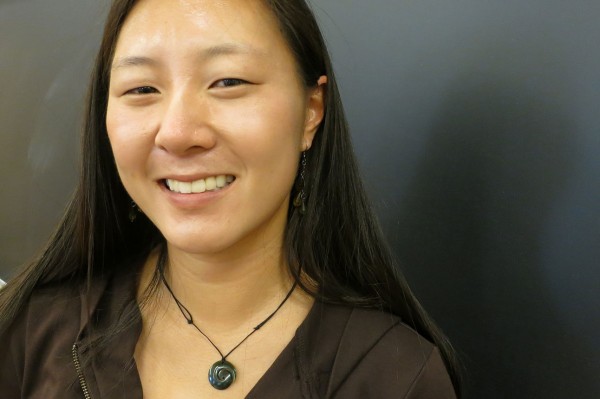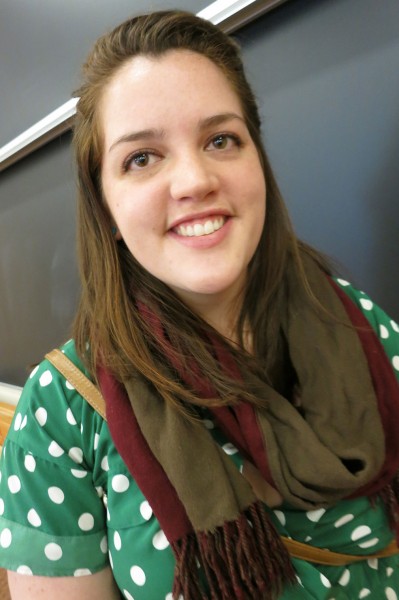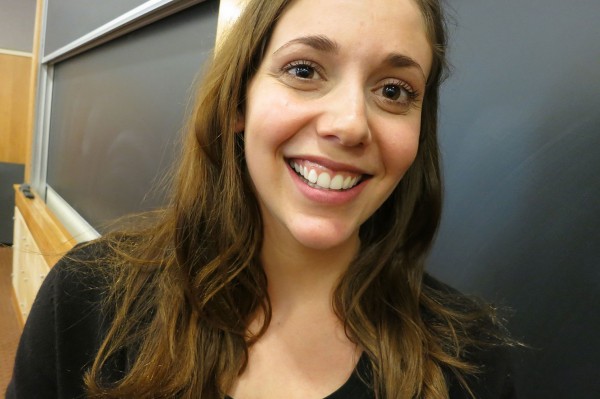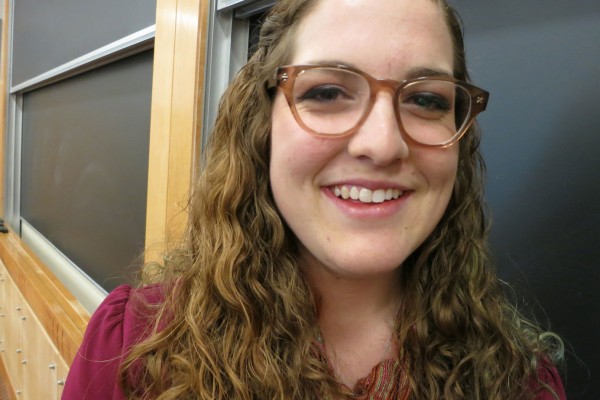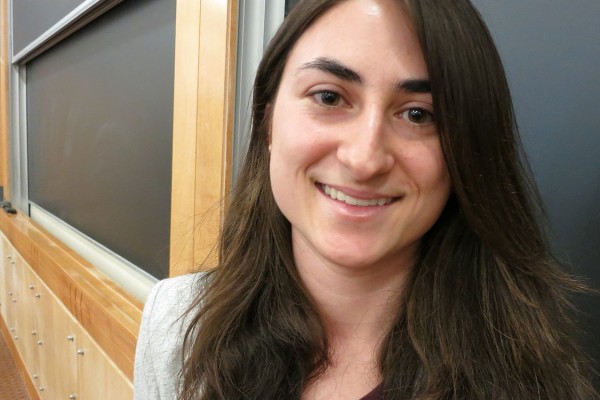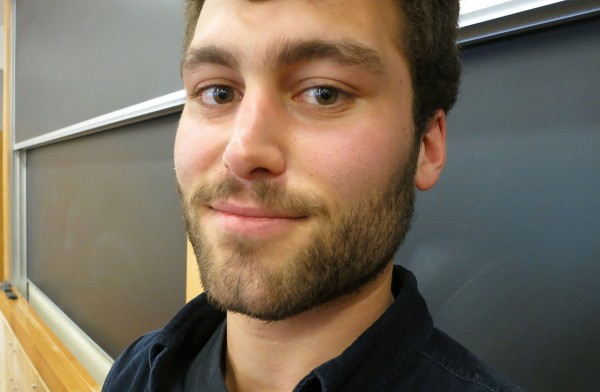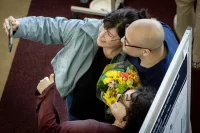
Audio: Seniors read creative writing — a bizarre bus ride, bomb-littered Hawaiian island and beloved poet
Spring being an elusive season in Maine, we tend to seek bellwethers that don’t depend on the weather.
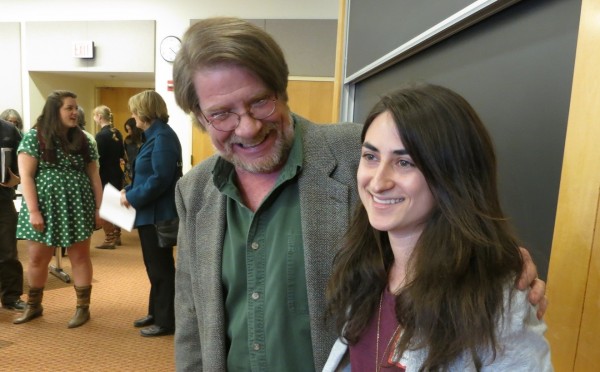
Senior Lecturer in English Robert Farnsworth congratulates Ashley Lepre ’13 after the annual creative writing thesis reading at Mount David Summit on March 29, 2013. Photographs by Jay Burns.
For Rob Farnsworth, who advises Bates’ creative writing students along with English department colleague and novelist Jessica Anthony ’96, spring arrives on Mount David Summit day, the annual academic festival of, in Farnsworth’s words, “student research, scholarship, analysis, composition, performance — you name it.”
“It’s my favorite event,” he added.
“Serious and deeply attentive discipline.”
Spring being all about rebirth writ large, the interplay of spring, the Summit and the creative work produced by student writers was also on Farnsworth’s mind.
A creative writing thesis “involves serious and deeply attentive discipline,” he said. “The experience offers those who undertake such projects a first experience in the practical and emotional challenges that the work of writing presents to anyone who seriously commits to it.”
Please note that some readings contain strong language.
Ashley Brunk ’13
Brunk, of Phoenix, Ariz., reads from her fiction thesis, “Sheila’s Heart.”
In the reading, the protagonist is Sheila, who in high school received a heart transplant and is now a senior in college.
Sheila helped to organize a buddy program called Big One, LIttle One, and her buddy in the program is Jessica, who has the congenital spinal cord condition spina bifada.
Other characters are Mark and Robbie, a buddy pair that Sheila and Jessica recently met; Coop, Sheila’s doctor; and Professor Doerer, faculty adviser for the buddy program; and Caitlin, one of Sheila’s friends.
Eryn Gilchrist ’13
Gilchrist of West Simsbury, Conn., reads from her fiction thesis, “The Sharpening of Carlton Beavers.”
In the reading, the protagonist is Carlton Beavers, who is on a bus that’s traveling from New Oreans to El Paso. He’s sitting next to “the worst person you can get stuck next to on a bus,” says Gilchrist.
That man is named Marvin Deckler, and he’s “very large, very opinionated, and the only carry-on he has is a megaphone. And, he speaks almost exclusively in very bad puns.”
Joanna Harran ’13
Harran, of Pukalani, Hawaii, reads three poems, two of which explore places in her native state.
https://www.bates.edu/news/files/2013/04/130329_0139-Harran1.mp3“Plumeria Graves” is about Keawala’i Church, a small stone building on the island of Maui, represents the blending of traditional Hawaiian polytheism with monotheism brought by Christian missionaries, explains Harran. Today, the church conducts services in Hawaiian, and is famed for its beautiful flowers, grounds and ocean views, and its distinctive, traditional Hawaiian stone graves.
https://www.bates.edu/news/files/2013/04/130329_0139-Harran2.mp3“New Woman” is about a woman trying to find a place in a family as she navigates a relationships with a man whose wife has recently died.
https://www.bates.edu/news/files/2013/04/130329_0139-Harran3.mp3“Paths” is set on the small Hawaiian island of Kaho’olawe. Used as a U.S. bombing range during World War II, the island today is littered with debris and unexploded ordnance.
During ancient times, Kaho’olawe was sacred land, used only for religious ceremonies and to train seafaring Polynesians how to use the stars for navigation. Still uninhabited today, Kaho’olawe is the focus of strategies to control erosion and re-establish vegetation.
Mollie Kervick ’13
Kervick, of Windsor Locks, Conn., reads five poems.
Her poetry, she says, asks explores the weaving of myth and family heritage. In the process, it asks and answers the question “How do I ground myself?” The act of writing, she concludes, “gives me a cultural context — something for me to grab on to.”
https://www.bates.edu/news/files/2013/04/130329_0139-Kervick1.mp3“Rose Anne Helferty” is based on a story that Kervick once heard about a relative named Rose Anne Helferty.
“The Death of Snowflake” is a poem written for Kervick’s older sister.
“On the Way to the Franciscan Well” is set in Ireland, where Kervick studied last year. Her father was visiting her, and “on the way to the pub, we heard a splash, and saw this beautiful object in the river.”
“A Boy Who Died in Cork” is about “someone I felt connected to, but never met,” she says.
“Winter at 30 Elm Street” is about her home in Windsor Locks, the town where she, her father, and her grandfather grew up in. “It’s the hub of many childhood memories,” she says. “What I’ve learned about writing is how strange and scary memories can be, and what sticks out.
Ashley Lepre ’13
Lepre, of Fairfield, Conn., delivered a selection of poems chock full of smart wit.
“The Sun Will Come Out Tomorrow”is from a series of ‘Where Are They Now?” poems about the fates of well-known fictional characters, this one muses about Orphan Annie’s potential career choices.
“This Be Worse” is a parody of a Phllip Larkin poem about parenting, “This Be the Verse.” Lepre reads Larkin’s original, then her parody, “This Be Worse.”
“The Bachelor: A Villanelle,” written in the 19-line villanelle format, is about the TV show The Bachelor. (Catch Lepre’s theme? So far, poems about orphans, bad parenting and dicey relationships.)
“The Brat” is a meditation on how a woman grow up to be a pitiable character on a reality show like The Bachelor or The Bachelorette? Maybe it happens like this.
Haiku featuring boiling pots, a dyslexic groomsman, poor mistletoe placement and wishing upon a star.
In this video clip, Lepre reads two haiku:
“The Way They Please”captures “a lot of how I feel about people and a lot of things in the world and a lot of parts of myself.”
Matt Williams ’13
Williams, of Clarksville, Md., reads a selection of creative nonfiction about his encounters with writers, including the poet Eileen Myles, titled “Eileen Myles, This Is Why I Love You.”
Williams is an American cultural studies major who is, in a sense, on loan from his major program.
He’s pursuing a creative writing thesis because he wants to confront and investigate his own subjectivity in his writing.
“The goal is to explicitly place myself as the author as well as a participant in my stories, confronting my own subjectivity through the use of ‘I.'”
